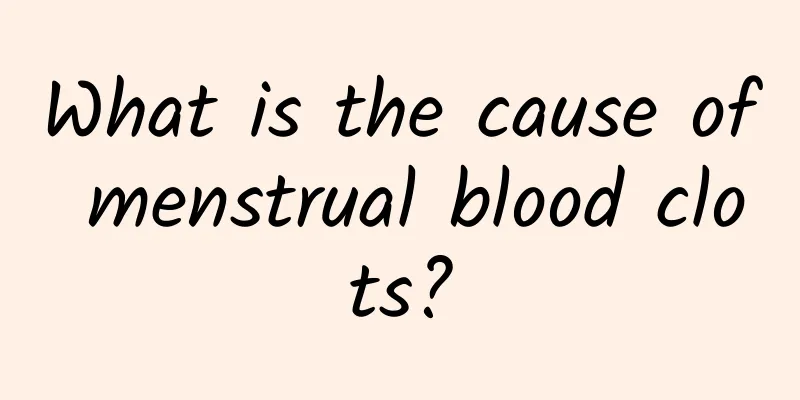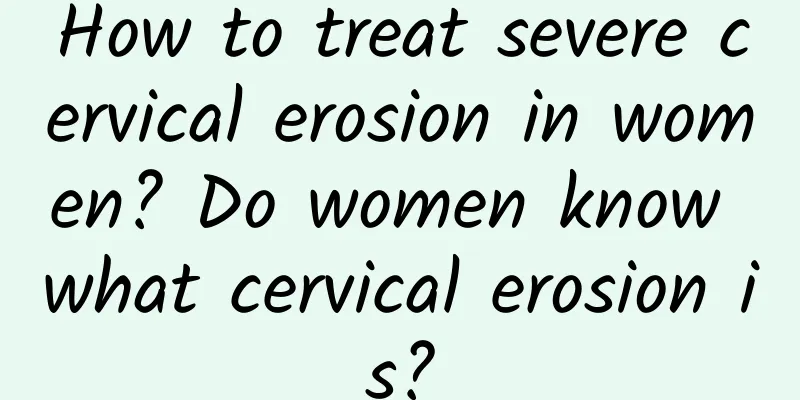What is the cause of menstrual blood clots?

|
What happens if I have a lot of blood clots during my period? Menstrual blood clots are often caused by excessive mental stress, colds, abnormal position of the intrauterine contraceptive device, endometritis, endometrial polyps, etc. After the doctor identifies the cause, targeted treatment can be carried out. 1. Excessive mental stress: Long-term mental stress and poor rest will cause the endometrium and some fibroblast tissue in the blood to be discharged during menstruation, leading to dysmenorrhea and blood clots. You need to adjust your work and rest habits in time and maintain a happy mood. 2. Catch a cold: Often eating cold food during menstruation, such as ice cream, ice cream, ice cubes, etc., will lead to increased menstrual volume, accompanied by the discharge of a large amount of blood clots. You can use a hot towel or hot water bottle to apply heat to the abdomen to improve the discomfort symptoms. 3. Abnormal position of intrauterine contraceptive device: After the intrauterine device is placed, it compresses the endometrium, which may cause poor blood circulation, congestion, and necrosis of the endometrium, resulting in scanty menstruation and shedding of necrotic tissue. The position of the intrauterine device needs to be adjusted under the surgery of a professional doctor. 4. Endometritis: Postpartum and cesarean section can cause trauma to the endometrium, causing the cervix to secrete a large amount of inflammatory factors, stimulating the endometrium and causing it to fall off. During menstruation, blood clots, lower abdominal pain and abnormal leucorrhea may occur. Patients can take azithromycin dispersible agents, amoxicillin capsules, cephalosporin capsules and other drugs as recommended by the doctor. 5. Endometrial polyps: It may be due to excessive estrogen levels in the body or stimulation by inflammatory factors. Long-term high-level stimulation will cause excessive growth of the endometrium, the formation of polyps, the discharge of odorous blood secretions, and the discharge of menstrual blood clots, accompanied by symptoms of prolonged menstruation. Surgical treatments such as hysteroscopic polypectomy and hysterectomy can be performed under the surgery of a professional doctor. During menstruation, you should pay attention to the local cleanliness and dryness of the vulva, and choose underwear made of soft and breathable fabrics, and avoid being too tight. |
>>: What are the causes of uterine fibroids?
Recommend
The second unbeatable weight loss trick: 6 kinds of food to reduce absorption
Love delicious food but afraid of getting fat? Th...
What to do if your menstrual period is very rare?
What should I do if my menstrual period is very l...
What are the manifestations of different inflammations in patients with pelvic inflammatory disease?
Pelvic inflammatory disease is a common disease i...
I have a history of candidal vaginitis and recently found a lot of leucorrhea. What should I do?
I have a history of candidal vaginitis and recent...
Is it high risk to get pregnant again after four miscarriages? What are the reasons for frequent miscarriages?
Nowadays, miscarriage is troubling more and more ...
As a woman, you should pay attention to the prevention of irregular menstruation as early as possible
In recent years, with the increasing incidence of...
Can drinking ice water help you lose weight? Or become obese? Wu Mingzhu: Menstrual pain and constipation have four major disadvantages that cannot be avoided
Eating ice and drinking ice water in summer can m...
Can I still get vaccinated when I am four months pregnant? What are the dangers?
It is also possible to have an abortion in the fo...
Does ovarian cyst affect pregnancy?
Ovarian cysts are cystic structures formed inside...
What medicine should I take if I have small uterine fibroids? What medicine should I take to treat small uterine fibroids?
What medicine should I take if I have small uteri...
What are the dangers of having sex too early after abortion? How long after abortion can a woman have sex?
1. What are the dangers of having sex too early a...
Tell you some diagnostic methods of ectopic pregnancy
At present, ectopic pregnancy is a disease that, ...
The dangers of taking emergency contraceptive pills right after menstruation
Taking emergency contraceptive pills when menstru...
Experts help women understand the manifestations of irregular menstruation
Irregular menstruation is a common disease among ...
How many days of rest is appropriate after a miscarriage?
The time needed to rest after abortion varies fro...









